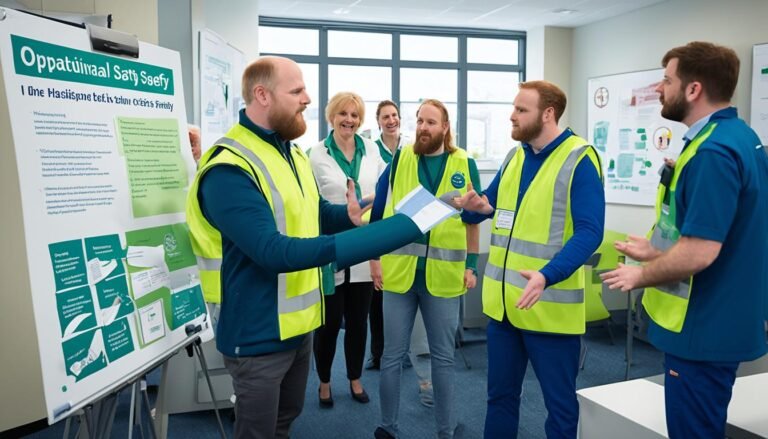Conducting Clinical Trials in Ireland: Key Regulatory Requirements
The Clinical Trials Regulation (CTR) in the EU started on 31 January 2022. It will be fully in place across all EU countries by 31 January 2025. This regulation brings the same rules to all EU members. It makes the approval process more efficient and guarantees top safety for those in trials.
In Ireland, the Health Products Regulatory Authority (HPRA) leads in applying the CTR. Their guide is full of info, from safety reports to Good Clinical Practice checks. It’s key for sponsors and researchers to get to know these rules well.
This article dives into Ireland’s clinical research rules. It offers details on deadlines, how to apply, and keeping things safe.
Key Takeaways
- The Clinical Trials Regulation (CTR) in the EU took effect on 31 January 2022.
- The HPRA provides detailed guidance on implementing the CTR in Ireland.
- The Clinical Trial Information System (CTIS) serves as the single entry point for trial information across the EU.
- All ongoing clinical trials must transition to the CTR by 31 January 2025.
- Understanding Ireland clinical trial requirements is essential for compliance and successful implementation of trials.
Overview of Clinical Trials Regulation (CTR) in Ireland
On January 31, 2022, the Clinical Trials Regulation (CTR) replaced the Directive in Ireland. This change improved how clinical trials work in the European Union (EU). Now, there’s a single portal for applying and managing clinical trials. This makes the process clearer, more ethical, and compliant with rules.
Introduction to the Clinical Trials Regulation (CTR)
In early 2022, the CTR started in Ireland and the EU. This followed the launch of a clinical trials portal and database. The European Medicines Agency’s Management Board confirmed this to the European Commission on April 21, 2021. The system, called the Clinical Trials Information System (CTIS), began on January 31, 2022. It helps with applying for and tracking clinical trials, with most information available to the public.
The CTR focuses on making sure trial participants are safe and well. It makes sure there’s just one way EU-wide to authorize clinical trials. This also covers getting participants’ agreement and sharing information openly. This makes clinical trials in Ireland more ethical, with clear rules to follow.
Key Dates and Transition Period
The move to the CTR took three years, from January 31, 2022, to January 31, 2025. During this time, trial sponsors began to use CTIS. By January 31, 2023, all new applications had to be through CTIS. Older ones in EudraCT moved to CTIS by January 31, 2025, when EudraCT closed.
This slow change let everyone get used to the new rules in time. It also made sure that everyone followed the new rules and kept clinical trials safe. Now, everyone reports trial safety and acts follow similar rules. This is true even for trials done outside the EU but looking to be approved in the EU.
Scope and Exemptions
The CTR covers clinical trials that test new and older treatments and devices on people. These trials happen in EU and EEA states. But, it doesn’t include some types of studies, medical device tests, or food supplement checks. Keeping these out helps focus on each kind of study specifically.
By making rules the same for trials all over the EU, the CTR improves how all trials get done. These strict rules aim to keep clinical trials honest, safe, and useful. They show a big commitment to new ideas in medicine while keeping people safe.
Regulatory Approval Process for Clinical Trials in Ireland
In Ireland, getting approval for clinical trials is a detailed process. It ensures that patient safety and the study’s scientific validity are top priorities. This process follows strict Irish clinical trial guidelines.
Application Submission via CTIS
Sponsors begin the clinical trial setup in Ireland by applying through the CTIS. This step helps decide the Member State that will lead the trial efforts. Applications have two parts to cover general trial info and specific participant details.
- Part I: It details the trial’s plan and the medicine under investigation.
- Part II: It includes specific requirements like participant consent forms.
Role of HPRA and Ethics Committees
The HPRA and ethics committees are key for trial approval in Ireland. The HPRA ensures every study is safe and scientifically sound. Meanwhile, ethics committees focus on the trial’s ethical sides, such as the consent process and looking after the participants.
HPRA’s team, made up of medical experts and other professionals, carefully assesses each trial’s risks and benefits. They only give a go to trials that show a positive safety profile. Plus, they keep an eye on them to protect the participants continuously.
Assessment Phases and Timelines
The process of reviewing a trial in Ireland follows specific steps:
- Validation Phase: This checks if all needed documents are there.
- Assessment Phase: It’s the detailed review, usually done within 45 days.
- Decision Phase: The final call is made with any needed changes or rules.
HPRA and the ethics committees ensure that every application gets looked at carefully and fairly. Their system, with clear deadlines, helps in the timely development of new healthcare options. This system also keeps the study’s ethical and scientific standards high.
| Phase | Responsibility | Timeline |
|---|---|---|
| Validation | Sponsor, HPRA | Up to 5 days |
| Assessment | HPRA, Ethics Committee | 45 days |
| Decision | HPRA | 10 days |
HPRA’s dedication to following these guidelines ensures all clinical trials in Ireland meet high safety and integrity standards. This systematic process supports the creation of impactful new treatments while upholding ethical and scientific practices.
Good Clinical Practice (GCP) and Safety Reporting
Making sure drug trials in Ireland follow Good Clinical Practice (GCP) rules is very important. Regular checks and careful safety reports help keep clinical trials safe and honest.
Good Clinical Practice (GCP) Inspections
In Ireland, experts from the Health Products Regulatory Authority (HPRA) check if trials are safe and fair. They come for routine (planned) inspections that last 3-5 days. These visits include looking at documents, talking to people, and checking out where the trials happen.
HPRA now also does inspections from afar. They use special tools to check trials without visiting in person. No matter how they do it, these checks are to make sure trials follow GCP’s rules to guard people and ensure correct findings.
Safety Reporting Requirements
Reporting safety issues is key during drug trials in Ireland. All safety data, including serious incident reports, must be carefully sent to places like EudraVigilance. HPRA checks the Trial Master File (TMF) closely. If this file’s missing, inspections may not go well. Findings from inspections can be critical, major, or minor. Depending on this, sponsors must fix any problems.
Handling Suspected Unexpected Serious Adverse Reactions (SUSARs)
It’s very important to deal with serious safety issues in the right way. Inspectors from HPRA look into these issues as part of their checks. They give a report back within 15 days of visiting. Sponsors then must make a plan to fix any problems they find.
Following GCP rules and being careful with safety reporting keeps drug trials in Ireland at high standards. This protects both the research integrity and the people taking part.
| Type of Inspection | Notification Period | Duration | Activities Involved |
|---|---|---|---|
| Routine | 4-6 weeks | 3-5 days | Document Review, Interviews, Facility Tours |
| Triggered | Variable | Case-by-Case | Scope tailored to specific issues |
Conducting Clinical Trials in Ireland: Key Regulatory Requirements
It’s crucial for researchers to know the Irish clinical trial laws and the Ireland clinical trial requirements. These are essential. The Clinical Trials Regulation (CTR) makes trial rules similar across the EU. This helps keep patients safe and their data secure.
The Health Products Regulatory Authority (HPRA) plays a key role. They make sure tests follow the rules and help with things like Good Clinical Practice (GCP), protecting data, and safety reports.
When working on a trial in Ireland, you must do a Data Protection Impact Assessment (DPIA). This is important for ethical checks, which are similar to those in France and Spain. Protecting data is critical, especially personal, biometric, and genetic data. The Data Protection Officer (DPO) must know a lot to help with the DPIA.
The EU’s Irish clinical trial laws are detailed in the Clinical Trials on Medicinal Products for Human Use Regulations 2022. They ensure everyone follows the same rules. These are published in the “Iris Oifigiúil.” They don’t include studies that don’t use medicine but still explain key roles and rules, making sure everyone understands what to do.
| Country | DPIA Requirement | Authority |
|---|---|---|
| France | Before application submission | CNIL |
| Spain | Before trial commencement | Farmaindustria |
| Ireland | With research application | NREC |
Ireland’s Minister for Health, Stephen Donnelly, has set clear definitions in the Regulations. This includes the duties of those involved, like investigators and sponsors. These rules meet EU standards, making sure each trial is done well and overseen properly.
Sponsors can include public hospitals and health providers in Ireland. But, they must have good management systems. The rules also clearly state the responsibilities of everyone involved. This is to make sure trials are done right and by the book.
To sum up, understanding the Irish clinical trial laws and Ireland clinical trial requirements is vital for the smooth running of trials. It makes sure trials meet legal standards and protect participants fully.
Conclusion
The new Clinical Trials Regulation (CTR) in Ireland and the EU aims to make clinical trials better. It focuses on making them safe, efficient, and clear. This will improve the trustworthiness of research. It’s important for everyone involved to know and follow these new rules.
The Health Products Regulatory Authority (HPRA) and local and central Research Ethics Committees (RECs) will oversee these changes. In Ireland, over 80 RECs are at work, but only 12 can review certain clinical trial applications. This mix of local and central RECs helps in making quick but thorough ethical checks.
Now, patients and the public have a bigger say in how research happens. This makes clinical trials more about the people involved. As Ireland and the EU work together on these new rules, they are making sure medical advances are safe and ethical. Ireland is playing a big role in global research by following these important guidelines.
Source Links
- Clinical Trials Regulation
- Regulatory, Ethics, Insurance – HRB NCTO | Health Research Board – National Clinical Trials Office
- Clinical trials – Regulation EU No 536/2014
- Regulation (EU) CTR 536/2014 | EU CTR Guide | Real Life Sciences
- Ireland’s clinical trial approval and safety monitoring process
- Clinical Trials and Interventions Governance
- S.I. No. 190/2004 – European Communities (Clinical Trials on Medicinal Products For Human Use) Regulations, 2004
- Good Clinical Practice (GCP) Inspections
- Good clinical practice for clinical trials
- Good clinical practice | European Medicines Agency
- Guide to DPIAs in EU Clinical Trials: Navigating Regulatory Submissions | VeraSafe
- S.I. No. 99/2022 – European Union (Clinical Trials on Medicinal Products for Human Use) (Principal) Regulations 2022
- Key Roles in the Governance and Management of Health Research – HSE | Research & Development
- Proposals for legislative changes for clinical trials








